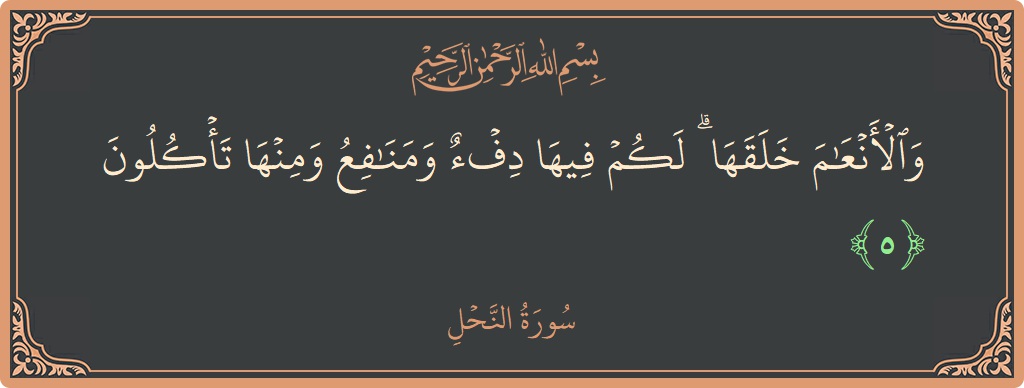Surah An-Nahl: Verse 5 - والأنعام خلقها ۗ لكم فيها... - English
Tafsir of Verse 5, Surah An-Nahl
English Translation
And the grazing livestock He has created for you; in them is warmth and [numerous] benefits, and from them you eat.English Transliteration
WaalanAAama khalaqaha lakum feeha difon wamanafiAAu waminha takuloonaTafsir of Verse 5
After human beings, mentioned there was the creation of things which were made specially for their benefit. Since the first addressees of the Qur'an were Arabs and their economic life depended on domestic cattle like camels, cows and goats, therefore, these were taken up first: وَالْأَنْعَامَ خَلَقَهَا (As for the cattle, He created them - 5).
Then, out of the benefits received by human beings from the cattle, two were particularly mentioned. (1) لَكُمْ فِيهَا دِفْءٌ (having warmth for you), that is, they use wool from them to make clothings which keep them warm during winters.
(2) The second benefit was mentioned in: وَمِنْهَا تَأْكُلُونَ (and of them you eat), that is, they can slaughter these animals and eat from their meat; and, when alive, they procure milk from them which is fine food indeed. Included here are butter, yogurt, butter-oil and everything else which fall under dairy products.
For the rest of benefits derived from them, only one word: مَنَافِعُ (manafi`: other benefits) was considered sufficient. It signifies that there are countless benefits tied to the meat, skin, bone and hair of animals. It is within the framework of this brevity, even ambiguity, that a hint has been given towards all modern innovations in the processing and use of food, dress, medicine and domestic articles, innovations which have been made to date, or will be made right through the Last Day.
After that, identified there is yet another benefit of these cattle - though, in terms of the contemporary Arab taste of the time - when it was said that these cattle make things look good for them particularly when they return home from their grazing grounds in the evening, or when they are sent out to graze in the mornings. The reason is that these cattle at that time become silent spokesmen of the strength and pride of their owners.
Finally, mention has been made of another important benefit which comes from these animals. They carry heavy loads to far out places, places which could not be reached 'without putting yourselves into hardship.' Out of the animals, camels and oxen have been particularly har-nessed into this service of man at a large scale. Even during our day of trains, trucks and cargo planes, human beings cannot universally claim to have become free of their need. There are places in the world where none of our modern means of transportation can work. Consequently, one is compelled to borrow their services.
The Cattle are part of the Creation of Allah and a Blessing from Him
Allah reminds His servants of the blessing in His creation of An`am, this term includes camels, cows and sheep, as was explained in detail in Surat Al-An`am where the "eight pairs" are mentioned. The blessings include the benefits derived from their wool and hair, from which clothes and furnishings are made, from their milk which is drunk, and their young which are eaten. Their beauty is a kind of adornment, thus Allah says,
(And there is beauty in them for you, when you bring them home in the evening.) which is when they are brought back from the pasture in the evening. This is a reference to how their flanks become fat, their udders fill with milk and their humps become bigger.
(and as you lead them forth to pasture (in the morning).) meaning when you send them out to the pasture in the morning.
(And they carry your loads) meaning the heavy burdens that you cannot move or carry by yourselves
(to a land that you could not reach except with great trouble to yourselves) meaning journeys for Hajj, `Umrah, military campaigns, and journeys for the purpose of trading, and so on. They use these animals for all kinds of purposes, for riding and for carrying loads, as Allah says:
(And verily, there is indeed a lesson for you in the An'am (cattle). We give you to drink (milk) of that which is in their bellies. And there are numerous (other) benefits in them for you. Of them you eat, and on them and on ships you are carried.) (23:21-22)
(Allah, it is He Who has made cattle for you, so that some you may ride, and some you may eat. And you find (many other) benefits in them; you may reach by their means a desire that is in your breasts (i.e. carry your goods, loads), and on them and on ships you are carried. And He shows you His Ayat. Which, then of the Ayat of Allah do you deny) (40:79-81). Thus here Allah says, after enumerating these blessings,
(Truly, your Lord is full of kindness, Most Merciful.) meaning, your Lord is the One Who has subjugated the An`am (cattle) to you. This is like the Ayat:
(Do they not see, that of what Our Hands have created, We created the An'am (cattle) for them, so that they may own them, and We subdued them so that they may ride some and they may eat some.)(36:71-72).
(And He made mounts for you out of ships and cattle. In order that you may ride on their backs, and may then remember the favor of your Lord when you mount upon them, and say: "Glory be to the One Who subjected this to us, and we could never have it (by our efforts). And verily, to Our Lord we indeed are to return!") (43:12-14) Ibn `Abbas said,
(In them there is warmth) refers to clothing;
(and numerous benefits) refers to the ways in which they derive the benefits of food and drink from them."
